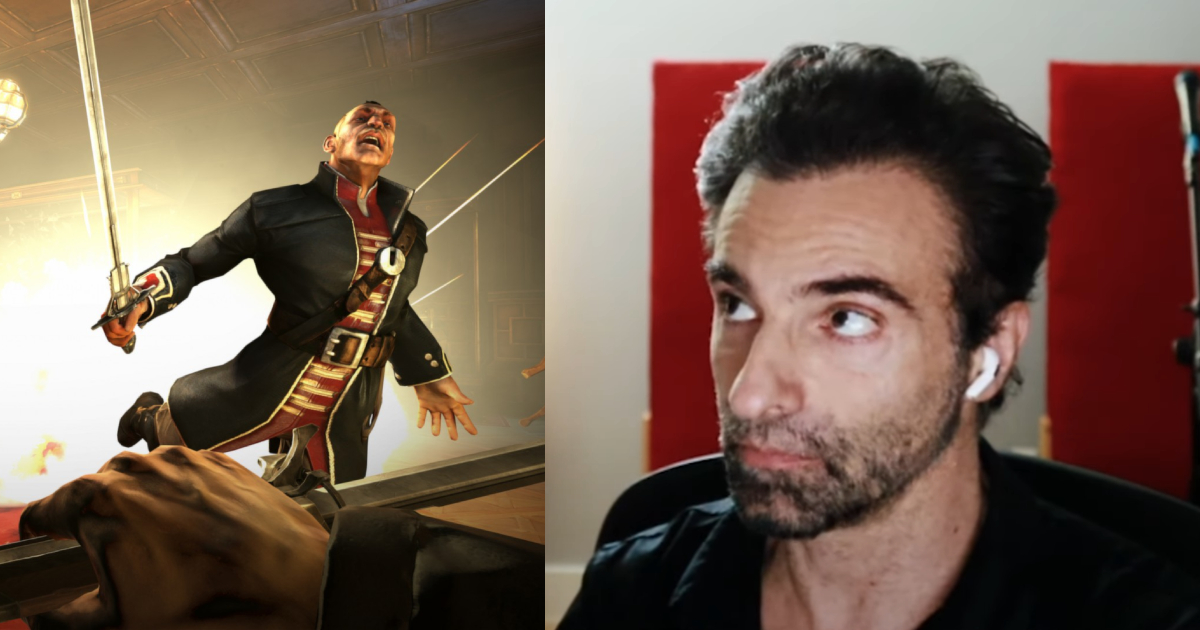Raphaël Colantonio discusses closure of Arkane Austin: "I was naive like everybody about what Microsoft was saying"
The closure of Arkane Austin caught many players and game developers off guard. Here is what prominent designer Raphaël Colantonio has to say about the demise of the studio, where he once helped shape the vision and create games like Dishonored and Prey.

Dishonored (left), Raphaël Colantonio (right)
The House of the Dev podcast, co-hosted by Raphaël Colantonio and Peter Salnikov, returned today after a 10-month hiatus. While the entire episode is worth listening to, especially for the conversation with Gloomwood co-creator Dillon Rogers, we want to focus on Colantonio’s thoughts on Microsoft’s decision to shut down Arkane Austin and several other studios.
But before we start, a quick reminder: Colantonio, who founded Arkane Studios in 1999, moved from France to the US in 2005 to establish a new office in Austin, Texas. There he met and bonded with Harvey Smith, a renowned designer known for System Shock and Deus Ex, eventually building a team to work on systems-heavy games they all loved. At Arkane Austin, Raphaël served as creative director on Dishonored and Prey before leaving the company in 2017. In 2019, he started a new independent studio, WolfEye, known for its immersive action RPG Weird West.
During the podcast, Colantonio said it was “heartbreaking” to see the news about the closure of Arkane Austin. He made a big bet on this venture and put a lot of efforts into building a strong team, hiring former Deus Ex developers such as Harvey Smith, Ricardo Bare, and Monte Martinez.
“It’s beautiful it even happened,” he said. “It was such a crazy challenge that not many would have followed me with, and not many would have thought it would have worked.” Although Colantonio processed most of the grief over what Arkane Austin meant to him after leaving the company in 2017, he still had friends who worked there at the time of the studio’s closure.
“Arkane as a global [team], not just Austin, represents a specific type of games,” Colantonio noted. “After Looking Glass was gone, we felt like we’re the ones who are still bearing the torch with another few developers […] I’m sure I can name five. It was a spirit that was, I think, important to some gamers and to us, so it’s sad for this.”
According to Colantonio, selling Arkane to Bethesda wasn’t a mistake, because the studio would have never made those games without it. But the Bethesda-Microsoft deal is a different story, since selling your company to a large public corporation usually comes with consequences. Founders and some executives (not Raph in this case, since he had already left Arkane at the time) get a lot of money, but talented developers risk losing their jobs if the results of their creative work don’t satisfy the corporate leadership.
They don't play the same game as independent developers or even big publishers do. That's another dimension. They have shareholders, they're public, the group is much bigger than just a gaming company. There's a lot behind it. You sell your company, and a big group offers you $7 billion — some people made a lot of money, I can guarantee you. And you got to accept studio closures as a potential consequence.
founder of Arkane Studios and WolfEye Studios
Despite some worrying signs, Colantonio didn’t see the closure of Arkane Austin coming, saying that he was “naive like everybody about what Microsoft was saying.”
The biggest loss here is tons of talented developers who worked on the team. While Microsoft’s decision can be justified from a business perspective, he thinks that the company made a huge mistake in terms of its long-term creative success. The main reason is that you can’t recreate a team with such a unique vision, dynamic, and culture. “Yeah, there’s a financial crisis, but if anything, Microsoft is probably the one who could have actually footed that for their own sake,” he said.
While Colantonio thinks it is unfair for all the people who worked at Arkane Austin, he believes that there will be more studios with similar vision in the future: “I think the people will survive. The companies end, and the people keep making games. So that spirit will trickle down, and a few years from now, there will be more of that Looking Glass-y kind of spirit.”
And Gloomwood is definitely a game with that spirit. For more insights into game design philosophy, indie game development, and different approaches to Early Access, watch the full episode below.
